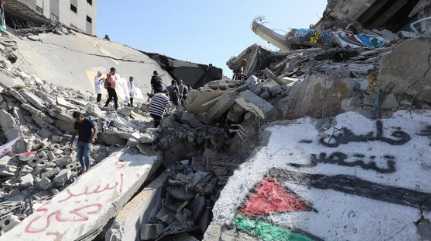
22 May 2024; MEMO: Israel reversed its decision to shut down an Associated Press (AP) live video feed of war-torn Gaza on Tuesday, following protests from the US news agency and concerns from the White House. Israeli Communications Minister Shlomo Karhi announced that he had revoked an earlier order accusing the AP of violating a new ban on providing continuous footage of Gaza to Qatar-based Al Jazeera.
“Since the ministry of defence wishes to examine the matter of the broadcasts from these locations in Sderot regarding the risk to our forces,” explained Karhi on X, “I have now ordered to cancel the operation and return the equipment to the AP agency, until a different decision is made by the Ministry of Defence.”
*משרד התקשורת*:
ציוד כלי התקשורת דיווח באופן שוטף על מיקום כוחות הצבא בצפון הרצועה-והוחרם.משרד התקשורת פעל היום להחרמת ציוד של כלי תקשורת, אשר דיווח לאלג׳זירה על מיקומי כוחותינו בצפון הרצועה, תוך סיכון החיילים בשטח, על אף התראות חוזרות ונשנות בנושא.
פעילות משרד התקשורת יצאה…
— 🇮🇱שלמה קרעי – Shlomo Karhi (@shlomo_karhi) May 21, 2024
A White House spokesperson said, “We’ve been engaging directly with the government of Israel to express our concerns over this action and to ask them to reverse it.”
In response, Lauren Easton, vice president of corporate communications at AP, said, “While we are pleased with this development, we remain concerned about the Israeli government’s use of the foreign broadcaster law and the ability of independent journalists to operate freely in Israel.”
She had earlier urged Israeli authorities to return the wire service’s equipment and allow its journalists “to reinstate our live feed immediately so we can continue to provide this important visual journalism to thousands of media outlets around the world.”
The latest twist in this saga comes after Israeli officials from the communications ministry arrived at the AP office in Sderot — an Israeli town near Gaza built on the ruins of the Palestinian village of Najd, which was ethnically-cleansed by Jewish terrorists on 13 May, 1948 — with a document signed by Karhi. He accused the agency of violating the country’s foreign broadcaster law, and so the officials confiscated the equipment.
Just before the seizure, the AP had been broadcasting a general view of famine-stricken northern Gaza, where Israeli forces continue their ground and aerial assault. The agency insisted that it complies with Israel’s military censorship rules, which prohibit the broadcast of sensitive details such as troop movements that could endanger soldiers.
The White House condemned the seizure as a “concerning” development. “We stand firm in our belief that journalists have the ability and right to do their jobs,” it said.
The Foreign Press Association (FPA), which represents international journalists in Israel, condemned the seizure, calling it the latest in a series of “chilling steps” by the Israeli government to stifle the media. “Israel’s record on press freedom has already been dismal throughout the war,” the FPA added. “For the entire conflict, it has prevented independent access to Gaza for foreign journalists. Now it has taken another step backward away from the democratic ideals it claims to uphold.”
The Palestinian resistance movement, Hamas, also criticised the move, slamming it as a “recurring, arbitrary, and oppressive act” against press freedom. The movement said that the action was intended to “cover up crimes” committed by Israeli forces against Palestinians.
Last month, Israel’s parliament passed a law that allows the closure of foreign networks operating in Israel and the confiscation of their equipment if the defence minister believes that broadcasts pose “actual harm to the state’s security”. In the first application of the law, the Israeli authorities raided the offices of Doha-based Al Jazeera television earlier this month and closed its bureau in occupied Jerusalem.




